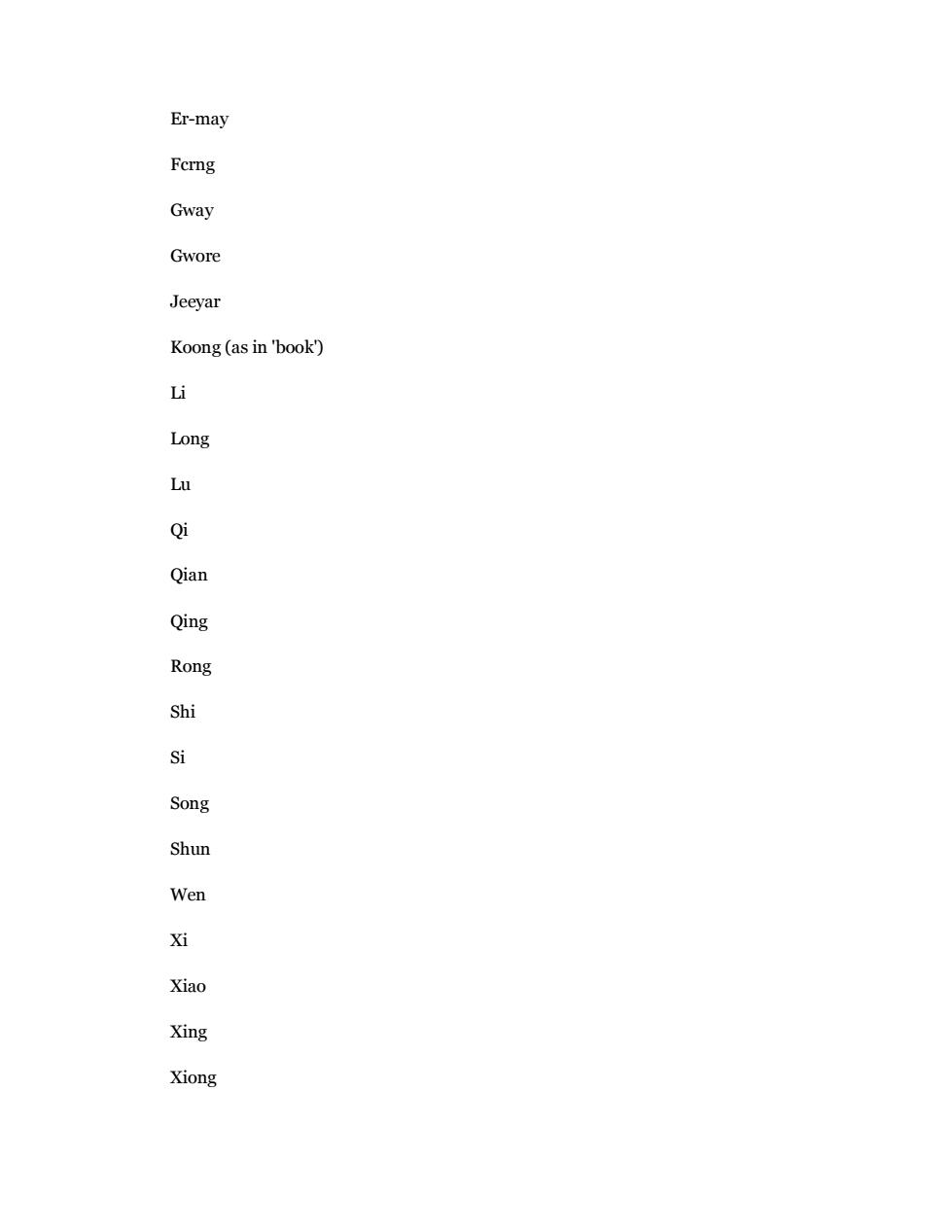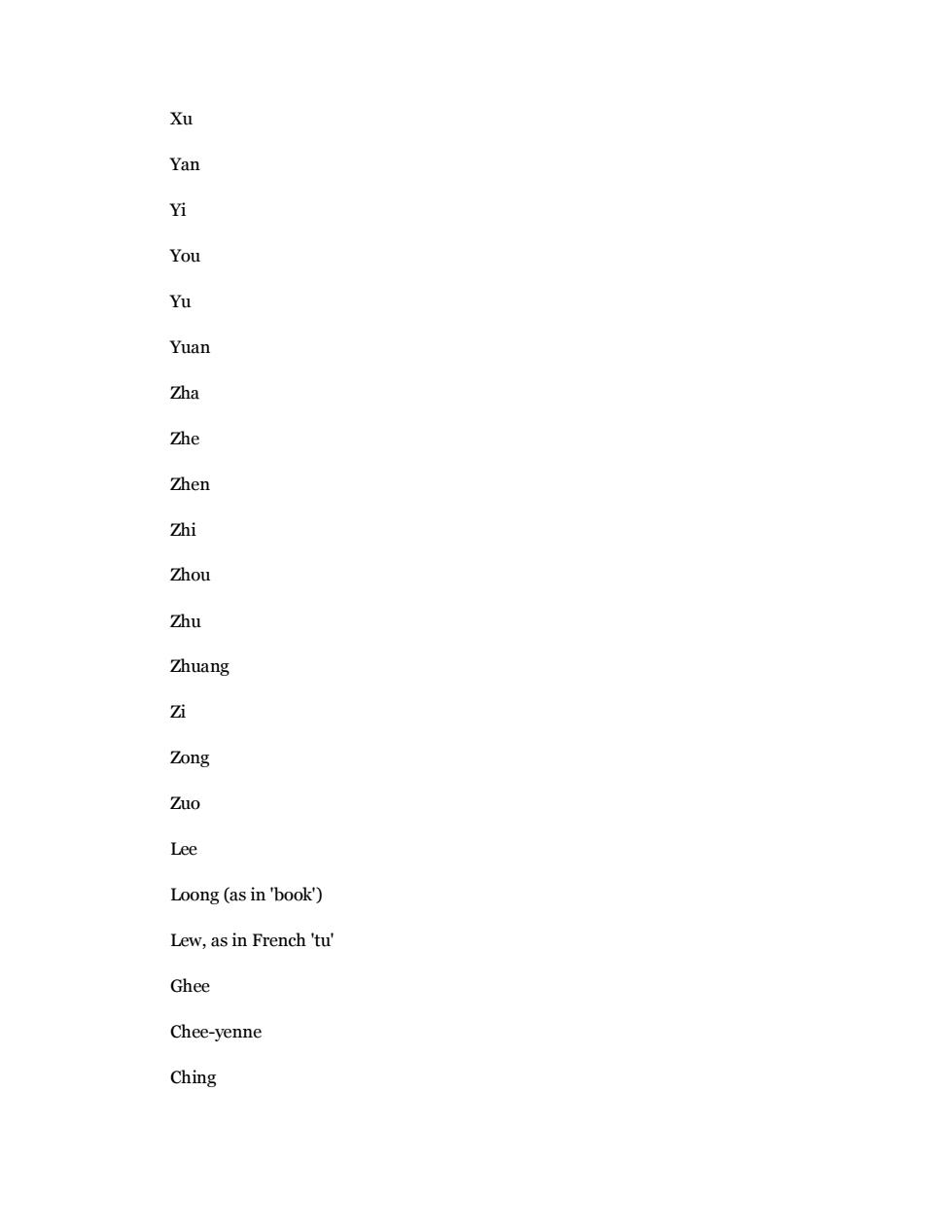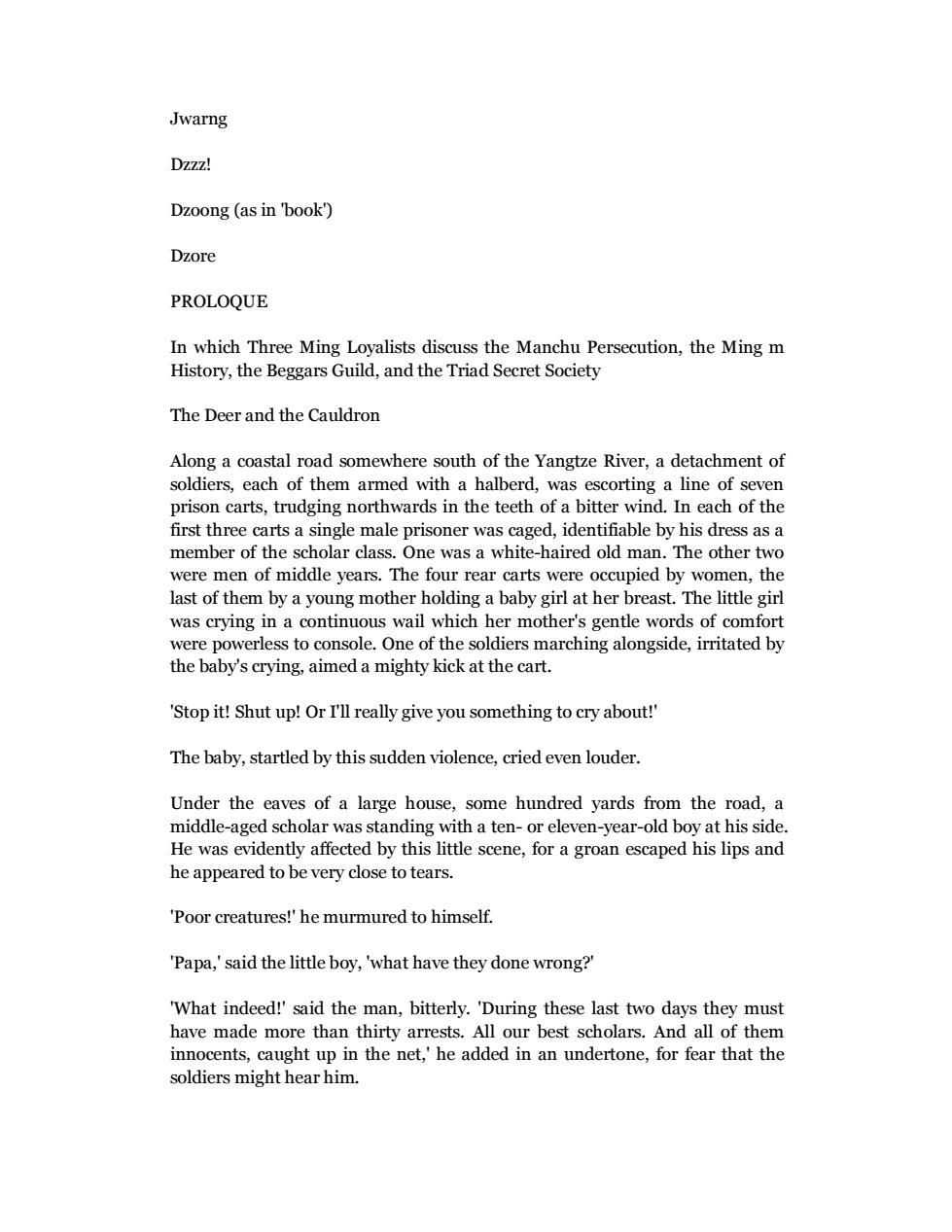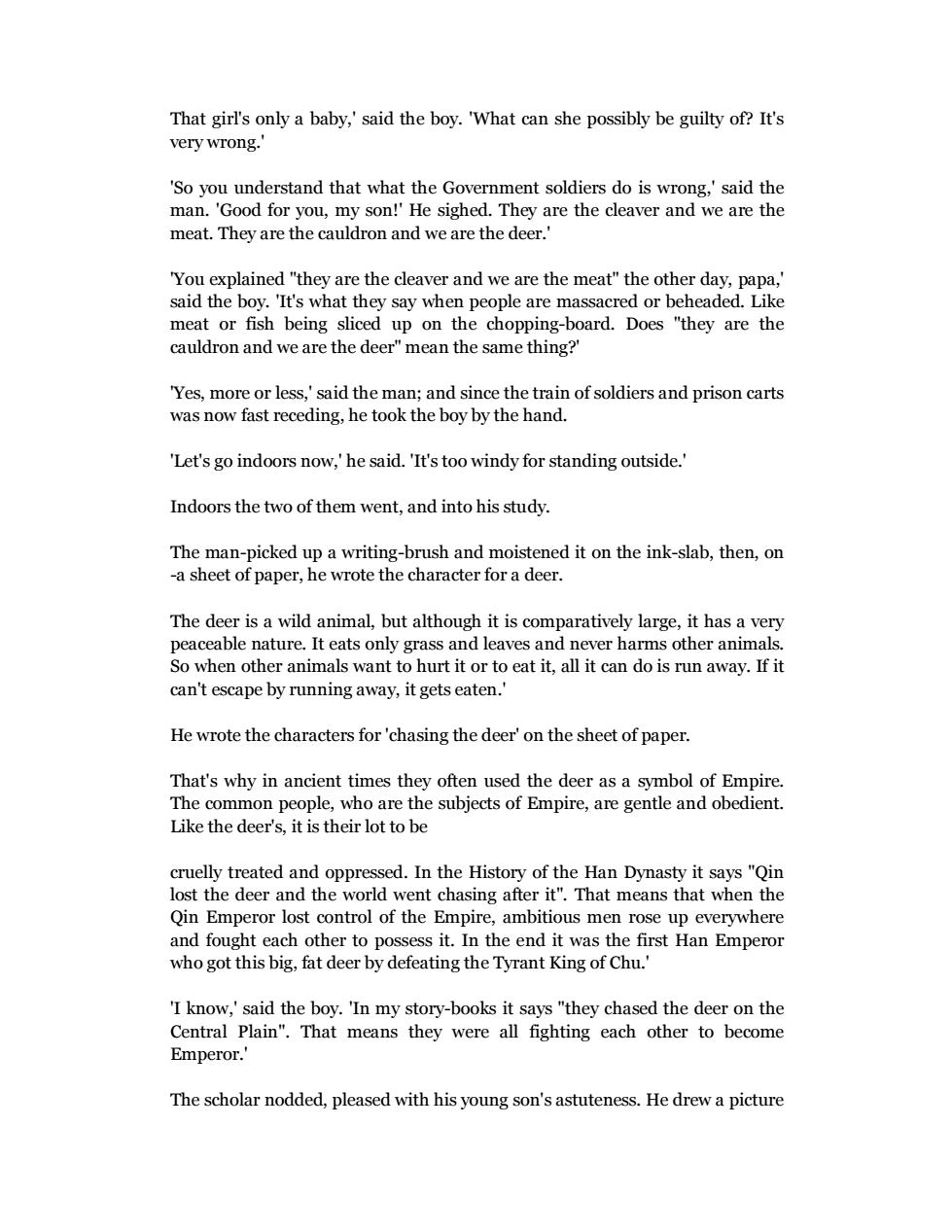
Er-mayFcrngGwayGworeJeeyarKoong (as in 'book)LiLongLuQiQianQingRongShiSiSongShunWenXiXiaoXingXiong
Er-may Fcrng Gway Gwore Jeeyar Koong (as in 'book') Li Long Lu Qi Qian Qing Rong Shi Si Song Shun Wen Xi Xiao Xing Xiong

XuYanYiYouYuYuanZhaZheZhenZhiZhouZhuZhuangZiZongZuoLeeLoong (as in 'book')Lew, as in French 'tu'GheeChee-yenneChing
Xu Yan Yi You Yu Yuan Zha Zhe Zhen Zhi Zhou Zhu Zhuang Zi Zong Zuo Lee Loong (as in 'book') Lew, as in French 'tu' Ghee Chee-yenne Ching

Roong (as in 'book)Shhh!Szzz!Soong (as in 'book')Shoon (as in 'should')as in'forgotten'SheeShee-ow (as in'shee-cow'without the'c)ShingSheeoongShyeu (as in French 'tu')Yen'YeeYo-heave-hoYewtree (as inFrench'tu')You, Anne!JarJem!JurnJim!JoeJew
Roong (as in 'book') Shhh! Szzz! Soong (as in 'book') Shoon (as in 'should') as in 'forgotten' Shee Shee-ow (as in 'shee-cow' without the 'c') Shing Sheeoong Shyeu (as in French 'tu') Yen ' Yee Yo-heave-ho Yew tree (as in French 'tu') You, Anne! Jar Jem! Jurn Jim! Joe Jew

JwarngDzzz!Dzoong (as in 'book')DzorePROLOQUEIn which Three Ming Loyalists discuss the Manchu Persecution, the Ming mHistory, the Beggars Guild, and the Triad Secret SocietyThe Deerand the CauldronAlong a coastal road somewhere south of the Yangtze River, a detachment ofsoldiers, each of them armed with a halberd, was escorting a line of sevenprison carts, trudging northwards in the teeth of a bitter wind. In each of thefirst three carts a single male prisoner was caged, identifiable by his dress as amember of the scholar class. One was a white-haired old man. The other twowere men of middle years. The four rear carts were occupied by women, thelast of them by a young mother holding a baby girl at her breast. The little girlwas crying in a continuous wail which her mother's gentle words of comfortwere powerless to console. One of the soldiers marching alongside, irritated bythe baby's crying, aimed a mighty kick at the cart.'Stop it! Shut up! Or I'll really give you something to cry about!The baby,startled bythis sudden violence, cried even louder.Under the eaves of a large house, some hundred yards from the road, amiddle-aged scholar was standing with a ten- or eleven-year-old boy at his sideHe was evidently affected by this little scene, for a groan escaped his lips andhe appeared to be very close to tears.'Poorcreatures!'hemurmuredtohimself.'Papa,said thelittleboy,'what havetheydone wrong?'what indeed!' said the man, bitterly.'During these last two days they musthavemademorethanthirtyarrests.All ourbest scholars.Andall oftheminnocents, caught up in the net, he added in an undertone,for fear that thesoldiers might hear him
Jwarng Dzzz! Dzoong (as in 'book') Dzore PROLOQUE In which Three Ming Loyalists discuss the Manchu Persecution, the Ming m History, the Beggars Guild, and the Triad Secret Society The Deer and the Cauldron Along a coastal road somewhere south of the Yangtze River, a detachment of soldiers, each of them armed with a halberd, was escorting a line of seven prison carts, trudging northwards in the teeth of a bitter wind. In each of the first three carts a single male prisoner was caged, identifiable by his dress as a member of the scholar class. One was a white-haired old man. The other two were men of middle years. The four rear carts were occupied by women, the last of them by a young mother holding a baby girl at her breast. The little girl was crying in a continuous wail which her mother's gentle words of comfort were powerless to console. One of the soldiers marching alongside, irritated by the baby's crying, aimed a mighty kick at the cart. 'Stop it! Shut up! Or I'll really give you something to cry about!' The baby, startled by this sudden violence, cried even louder. Under the eaves of a large house, some hundred yards from the road, a middle-aged scholar was standing with a ten- or eleven-year-old boy at his side. He was evidently affected by this little scene, for a groan escaped his lips and he appeared to be very close to tears. 'Poor creatures!' he murmured to himself. 'Papa,' said the little boy, 'what have they done wrong?' 'What indeed!' said the man, bitterly. 'During these last two days they must have made more than thirty arrests. All our best scholars. And all of them innocents, caught up in the net,' he added in an undertone, for fear that the soldiers might hear him

That girl's only a baby,' said the boy. 'What can she possibly be guilty of? It'sverywrong.'So you understand that what the Government soldiers do is wrong,'said theman. 'Good for you, my son!' He sighed. They are the cleaver and we are themeat. They are the cauldron and we are the deer.'You explained"theyare thecleaver and we arethemeat"the otherday,papa,'said the boy. 'It's what they say when people are massacred or beheaded. Likemeat or fish being sliced up on the chopping-board. Does "they are thecauldron and wearethedeer"mean the samething?'Yes,more orless,said theman; and since thetrain of soldiers and prison cartswas nowfast receding,he tookthe boybythehand.'Let's go indoors now,' he said. 'It's too windy for standing outside.Indoors the two of them went, and into his study.The man-picked up a writing-brush and moistened it on the ink-slab, then, on-a sheet of paper, he wrote the character for a deer.The deer is a wild animal, but although it is comparatively large, it has a verypeaceable nature. It eats only grass and leaves and never harms other animals.So when other animals want to hurt it or to eat it, all it can do is run away. If itcan't escape by running away, it gets eaten.'He wrote the charactersfor'chasing the deer'on the sheet of paperThat's why in ancient times they often used the deer as a symbol of Empire.The common people, who are the subjects of Empire, are gentle and obedientLike the deer's, it is their lot to becruelly treated and oppressed. In the History of the Han Dynasty it says "Qinlost the deer and the world went chasing after it": That means that when theQin Emperor lost control ofthe Empire,ambitious men roseup everywhereand fought each other to possess it. In the end it was the first Han Emperorwho got this big, fat deer by defeating the Tyrant King of Chu.''I know,' said the boy.'In my story-books it says "they chased the deer on theCentral Plain". That means they were all fighting each other to becomeEmperor.'The scholar nodded, pleased with his young son's astuteness. He drew a picture
That girl's only a baby,' said the boy. 'What can she possibly be guilty of? It's very wrong.' 'So you understand that what the Government soldiers do is wrong,' said the man. 'Good for you, my son!' He sighed. They are the cleaver and we are the meat. They are the cauldron and we are the deer.' 'You explained "they are the cleaver and we are the meat" the other day, papa,' said the boy. 'It's what they say when people are massacred or beheaded. Like meat or fish being sliced up on the chopping-board. Does "they are the cauldron and we are the deer" mean the same thing?' 'Yes, more or less,' said the man; and since the train of soldiers and prison carts was now fast receding, he took the boy by the hand. 'Let's go indoors now,' he said. 'It's too windy for standing outside.' Indoors the two of them went, and into his study. The man-picked up a writing-brush and moistened it on the ink-slab, then, on -a sheet of paper, he wrote the character for a deer. The deer is a wild animal, but although it is comparatively large, it has a very peaceable nature. It eats only grass and leaves and never harms other animals. So when other animals want to hurt it or to eat it, all it can do is run away. If it can't escape by running away, it gets eaten.' He wrote the characters for 'chasing the deer' on the sheet of paper. That's why in ancient times they often used the deer as a symbol of Empire. The common people, who are the subjects of Empire, are gentle and obedient. Like the deer's, it is their lot to be cruelly treated and oppressed. In the History of the Han Dynasty it says "Qin lost the deer and the world went chasing after it". That means that when the Qin Emperor lost control of the Empire, ambitious men rose up everywhere and fought each other to possess it. In the end it was the first Han Emperor who got this big, fat deer by defeating the Tyrant King of Chu.' 'I know,' said the boy. 'In my story-books it says "they chased the deer on the Central Plain". That means they were all fighting each other to become Emperor.' The scholar nodded, pleased with his young son's astuteness. He drew a picture